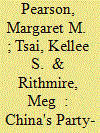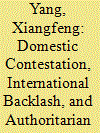| Srl | Item |
| 1 |
ID:
187767


|
|
|
|
|
| Summary/Abstract |
Contrary to expectations, economic interdependence has not tempered security conflict between China and the United States. In response to perceived domestic and external threats, the Chinese Communist Party's actions to ensure regime security have generated insecurity in other states, causing them to adopt measures to constrain Chinese firms. Security dilemma dynamics best explain the subsequent reactions from many advanced industrialized countries to the evolution of China's political economy into party-state capitalism. Party-state capitalism manifests in two signature ways: (1) expansion of party-state authority in firms through changes in corporate governance and state-led financial instruments; and (2) enforcement of political fealty among various economic actors. Together, these trends have blurred the distinction between state and private capital in China and resulted in backlash, including intensified investment reviews, campaigns to exclude Chinese firms from strategic sectors, and the creation of novel domestic and international institutions to address perceived threats from Chinese actors. The uniqueness of China's model has prompted significant reorganization of the rules governing capitalism, both nationally and globally.
|
|
|
|
|
|
|
|
|
|
|
|
|
|
|
|
| 2 |
ID:
181915


|
|
|
|
|
| Summary/Abstract |
This article aims to provide a first-cut analysis of the causes of the initial COVID-19 outbreak as well as the subsequent political contestations in which the masses ended up rallying behind the party-state. While the Wuhan fiasco had everything to do with entrenched pathologies of the bureaucratic state, after Beijing took central command of the broader campaign its overriding priority was to contain the virus with a goal toward salvaging its legitimacy at home. To that end, Beijing unleashed its warrior diplomats to aggressively defend its handling of the pandemic, even to the detriment of its international image. Nevertheless, the strategy worked because the nationalist and populist backlash against the regime’s foreign and domestic critics helped turn the public opinion around in its favor.
|
|
|
|
|
|
|
|
|
|
|
|
|
|
|
|